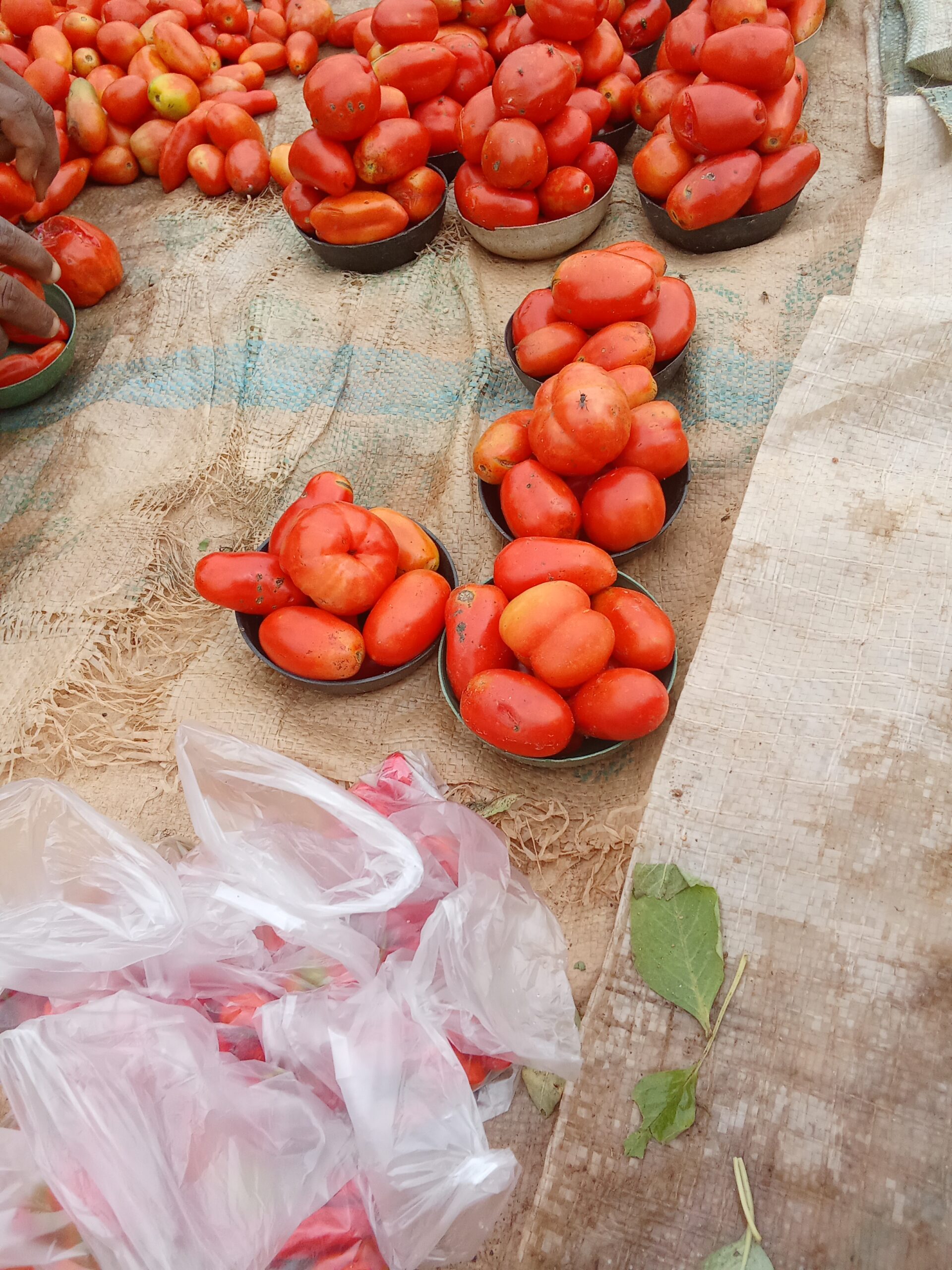Acute hunger resulting from food shortage is currently confronting the over 230 million Nigerian populace. Insecurity among other factors is fuelling the food and hunger crises across the country. But with increased agricultural schemes orchestrated by a government that has the political will can respond adequately to the challenge. Ogbodo Ozioma Favour reports
The prevalent hardship is no doubt having an impact in all front, faced with numerous challenges such as; climate change, population growth and economic instability is biting hunger and increased in prices of agricultural produces and continuous food shortage which
underscores the urgent need to explore sustainable solutions that cannot only address immediate food shortages but build resilience in the agriculture sector.
The current situation of hunger stretches beyond the price of 1kilo of local Rice which is currently sold at N,1608.09 which indicates a whooping sum of 189.79% price increase on a year-on year basis, likewise the price of 1kilo of brown beans is currently sold at N2,009.34 which indicates an increased of 219.05% on a year-on year bases, the average price of 1kilo of tomatoes rose by 196.92% from N498.34 to N1,479.69 on a year-on- year bases, a kilo of white garri is currently at N,114.72 which indicates 30.8% on a month-on- month bases and a kilo of yam tuber is currently sold at N1,322.36 which indicates 189.20% increase on a year- on-year bases as recorded by the National Bureau of Statistics (NBS) selected food prices watch for May to the ravaging increase in malnutrition due to food insecurity.
Recent data from Doctors without Borders which is also known as Médecins Sans Frontiéres showed that 52,278 impatient are suffering malnutrition in Nigeria.
Recent reports from Action against hunger list Nigeria among the top 8th countries with growing concern of hunger crisis and Nigeria risk joining countries with highest hunger crisis level alert and these countries include; Haiti, Mali, South Sudan, Sudan and occupied Palestinian territories.


Farming as a sustainable solution can mitigate hunger crisis, provide essential food supplies and contribute significantly to economic development, employment generation and poverty reduction. By enhancing agricultural productivity and promoting efficient farming practices, Nigeria can effectively bolster food security and improve livelihood but this comes with its challenges in Nigeria which includes; Insecurity, climate change and elliptical agricultural policies.
Insecurity
Insecurity is one of the challenges farmers are facing in Nigeria. These include challenges comes from open grazers and terrorist activities thereby instigating fear amongst farmers and leading to food shortages and food insecurity; which means lack of regular access to enough safe and nutritious food for normal growth and development for an active and healthy life.
According to data from Open Grazing Laws in Nigeria, conflicts between farmers and herdsmen goes as far back as 1999 and this resurgence is seen is continuous killing of farmers and recently in Amnesty international report in 2020 it was recorded that, 1531 people died in inter communal violence between herdsmen and farming communities as well as attacks by bandits.
Though Southern Governors including Ekiti State governor and Benue State met concerning ban on open grazing in July 2021 but 13 states out I7 states in Southern Nigeria currently established ban on open grazing and this ban remains controversial and differs from state to state on bases of pastoral communities.
Climate Change, the effect of climate change is seen from rising sea levels threatening cities in the South to increasing vulnerability to flooding and waterborne disease, drought and reduced rainfall, combined with rising air temperatures, inhibit the country’s hydropower systems, and hinder agricultural production and fishing, causing food insecurity and negatively impacting health and nutrition.
Agricultural Policy; According to data from the National Bureau Statistics (NBS) on foreign trade statistics Nigeria spent over N11.6tn on the importation of agricultural products during the nine-year period which it spent over N1.1tn on the Central Bank of Nigeria-led Anchor Borrowers Programme and other interventions in the agricultural sector to create economic linkages between small holder farmers and processors with a view to increasing agricultural output and most farmers didn’t benefit from this scheme.
High Cost Of Agricultural Produce And Food Shortage
These challenges keep hindering farming likewise leading to high cost of agricultural produce and food shortage. In Nigeria, agriculture grants range from the US. African Development and Ekiti State Government Grant, AyuTe Africa Challenge in Nigeria, GAIN micro Grant for Empowerment, Arrell Global Food Innovative Awards, SMEDAN conditional Grant Scheme, USADF Agriculture Grant, Pitch AgriHack Challenge to International Funds Agricultural Development (IFAD) financing which recorded only 3,912,180 has been impacted through this scheme and with 223 million populace, this show the urgent need for inclusion and more investment farming.
Solution and Recommendation
Africa Health Report (AHR) spoke to Mr. Adedeji Joseph Oluwapelumi who is a Cocoa and Plantain farmer in South West in an interview who proffer a solution to challenges farmers are currently facing in Nigeria emphasizing how God has blessed Nigeria with the best fertile soil in the world.
Our land is rich in nutrients and minerals required to sustain the cultivation of a vast range of crops, but it has not been exploited enough.
Currently, Nigeria is faced with a high rate of unemployment too, the unemployed being smart, able men and women who have learned various skills in our prestigious institutions and can learn and consume more knowledge on practices beneficial to them and the country at large.
Nigeria CAN Tackle Food Shortage
Nigeria has what it takes to tackle the food insecurity starting from organizing seminars, workshops, and conferences to existing farmers so as to enlighten farmers on how to better cultivate whatever they are growing at the moment to give an abundant yield or maximize output.
Secondly, provide them with grants and accessible loans to be able to invest in their businesses which in turn will increase their yields.
Thirdly, supply them with modern types of machinery and teach them how to use them efficiently to increase the amount of work done and yield in the shortest time possible.
Even if the government cannot give it out to them freely, design a functioning instalment structure for repayment, this helps reduce the cost burden on the farmers and subsidise the cost of crop chemicals, drugs, and fertilisers needed in fighting farm pests and boosting their yields.
Set up a body to set standards every farmer’s crop/ product has to meet to be marketable and these standards have to be adhered strictly and every farmer who is on loan, creates an alternative means of payment, not necessarily cash, for instance, a percentage of their produce can go to the government.
Subsidise or provide them with tools to be able to carry out their work efficiently.
Set up research institutes to improve our seedlings and equip farmers with these hybrids to speed up crop growth and increase yield in the shortest time.
For the newly empowered people, firstly, they need lands, provide them with lands to cultivate at a minimal cost.
Make grants and loans accessible to them, and teach and guide them through the fundamental/elementary stages till they master the art. Every other thing listed above is applicable.
Farmers’ Challenges
Farmers are currently faced with a lot of challenges which shorten production. Examples of these are bad road network to farms, lack of good network coverages/ service for effective communication, the increasing cost of tools, chemicals, and fertilisers required for the jobs, lack of adequate knowledge, lack of access to machines to make the jobs easier, lack of research institutes dedicated to improving seedlings and studying the changes in weather conditions to figure out the best ways of cultivating and teaching farmers to maintain continuity even amidst the weather change, lack of better and modern preservative methods to keep the produce after harvest, lack of pricing standards, I mean that prices of produce vary with various buyers and sellers. Lack of workers, inaccessibility of grants and loans, lack of support from the government.
Agriculture in Nigeria is epileptic. Though farmers are doing their best however, considering that we have been doing this by ourselves without external support, we have tried on our part.
We still need to explore and invest in agriculture as a country.
The country has what it takes to run smoothly on its own but the lack of resources needed to acquire this status has continuously sullied the efforts of trying farmers.
The government’s focus has shifted from agriculture to oil.
There used to be a time when agriculture used to be the pride of Nigeria but not anymore and the hard truth is before you’d be able to go in pursuit of your oil affairs, you’ve got to eat first.
How will you eat if the agricultural system isn’t functioning?
Moving forward, the government needs to take bold steps in restoring the agricultural sector by constructing a good road network to farm settlements, and all other things listed above.



